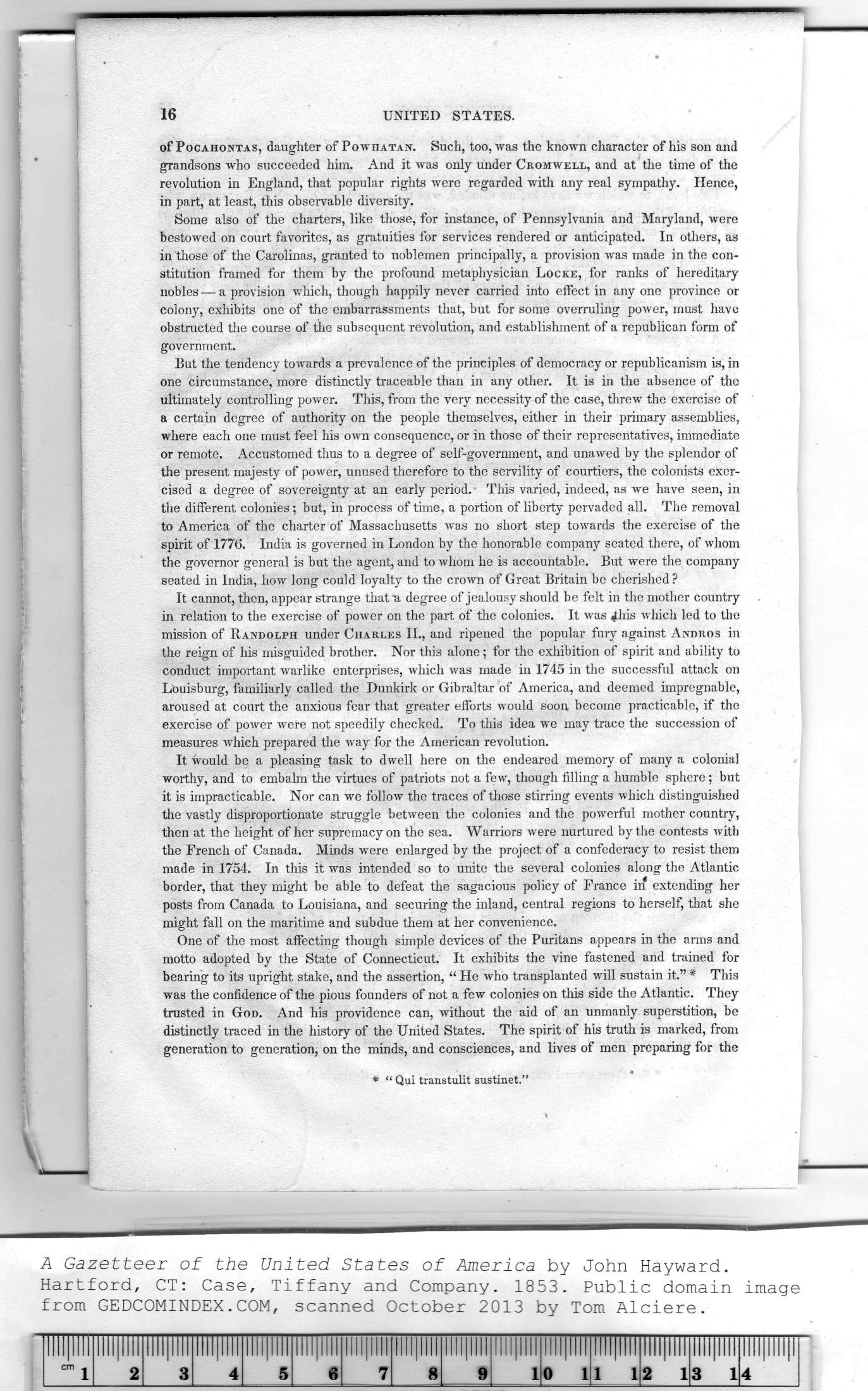|
|
Note: Ctrl and + increases the font size of the text below, Ctrl and - decreases it, and Ctrl and 0 resets it to default size.
16 UNITED STATES.
of Pocahontas, daughter of Powhatan. Such, too, was the known character of his son and
grandsons who succeeded him. And it was only under Cromwell, and at the time of the
revolution in England, that popular rights were regarded with any real sympathy. Hence,
in part, at least, this observable diversity.
Some also of the charters, like those, for instance, of Pennsylvania and Maryland, were
bestowed on court favorites, as gratuities for services rendered or anticipated. In others, as
in those of the Carolinas, granted to noblemen principally, a provision was made in the con-
stitution framed for them by the profound metaphysician Locke, for ranks of hereditary
nobles — a provision which, though happily never carried into effect in any one province or
colony, exhibits one of the embarrassments that, but for some overruling power, must have
obstructed the course of the subsequent revolution, and establishment of a republican form of
government.
But the tendency towards a prevalence of the principles of democracy or republicanism is, in
one circumstance, more distinctly traceable than in any other. It is in the absence of the
ultimately controlling power. This, from the very necessity of the case, threw the exercise of
a certain degree of authority on the people themselves, either in their primary assemblies,
where each one must feel his own consequence, or in those of their representatives, immediate
or remote. Accustomed thus to a degree of self-government, and unawed by the splendor of
the present majesty of power, unused therefore to the servility of courtiers, the colonists exer-
cised a degree of sovereignty at an early period. This varied, indeed, as we have seen, in
the different colonies; but, in process of time, a portion of liberty pervaded all. The removal
to America of the charter of Massachusetts was no short step towards the exercise of the
spirit of 1776. India is governed in London by the honorable company seated there, of whom
the governor general is but the agent, and to whom he is accountable. But were the company
seated in India, how long could loyalty to the crown of Great Britain be cherished ?
It cannot, then, appear strange that a degree of jealousy should be felt in the mother country
in relation to the exercise of pow'er on the part of the colonies. It was ^this which led to the
mission of Randolph under Charles II., and ripened the popular fury against Andros in
the reign of his misguided brother. Nor this alone ; for the exhibition of spirit and ability to
conduct important warlike enterprises, which wras made in 1745 in the successful attack on
Louisburg, familiarly called the Dunkirk or Gibraltar of America, and deemed impregnable,
aroused at court the anxious fear that greater efforts would soon become practicable, if the
exercise of power were not speedily checked. To this idea we may trace the succession of
measures which prepared the way for the American revolution.
It would be a pleasing task to dwell here on the endeared memory of many a colonial
worthy, and to embalm the virtues of patriots not a few, though filling a humble sphere; but
it is impracticable. Nor can we follow the traces of those stirring events which distinguished
the vastly disproportionate struggle between the colonies and the powerful mother country,
then at the height of her supremacy on the sea. Warriors were nurtured by the contests with
the French of Canada. Minds were enlarged by the project of a confederacy to resist them
made in 1754. In this it was intended so to unite the several colonies along the Atlantic
border, that they might be able to defeat the sagacious policy of France in extending her
posts from Canada to Louisiana, and securing the inland, central regions to herself, that she
might fall on the maritime and subdue them at her convenience.
One of the most affecting though simple devices of the Puritans appears in the arms and
motto adopted by the State of Connecticut. It exhibits the vine fastened and trained for
bearing to its upright stake, and the assertion, “ He who transplanted will sustain it." * This
was the confidence of the pious founders of not a few colonies on this side the Atlantic. They
trusted in God. And his providence can, without the aid of an unmanly superstition, be
distinctly traced in the history of the United States. The spirit of his truth is marked, from
generation to generation, on the minds, and consciences, and lives of men preparing for the
* “ Qui transtulit sustinet."
|
Illllllll |
Illllllll |
Illllllll |
Illllllll |
llll llll |
llll|llll |
llll|llll |
llll|llll |
Illllllll |
Illllllll |
Illllllll |
Illllllll |
Illllllll |
Illllllll |
lll!|!ll!|l |
|
cm j |
2 |
3 |
4 |
5 |
6 |
7 |
8 |
9 |
1 |
0 1 |
1 1 |
2 1 |
3 1 |
4 |
|
